Entrepreneurship: Analysis of Airbnb, Zambrero, and Qantas
VerifiedAdded on 2019/11/26
|12
|2715
|190
Essay
AI Summary
This essay examines the concept of entrepreneurship, defining it as the management of an enterprise with personal initiative, highlighting the importance of innovation and understanding customer needs. The essay then delves into detailed analyses of three successful ventures: Airbnb, Zambrero, and Qantas. For Airbnb, the essay explores its inception, the founders' motivations, and the factors contributing to its success, including disruptive innovation and adaptability. The analysis of Zambrero focuses on founder Sam Prince's social entrepreneurship, highlighting his motivations, business strategies, and contributions to charitable causes. Lastly, the essay discusses Qantas Airways, tracing its origins, the founders' motivations, and the role of innovation in its success within the airline industry. The essay concludes by summarizing the key factors that drive entrepreneurial success, such as innovation, adaptability, and understanding market opportunities.
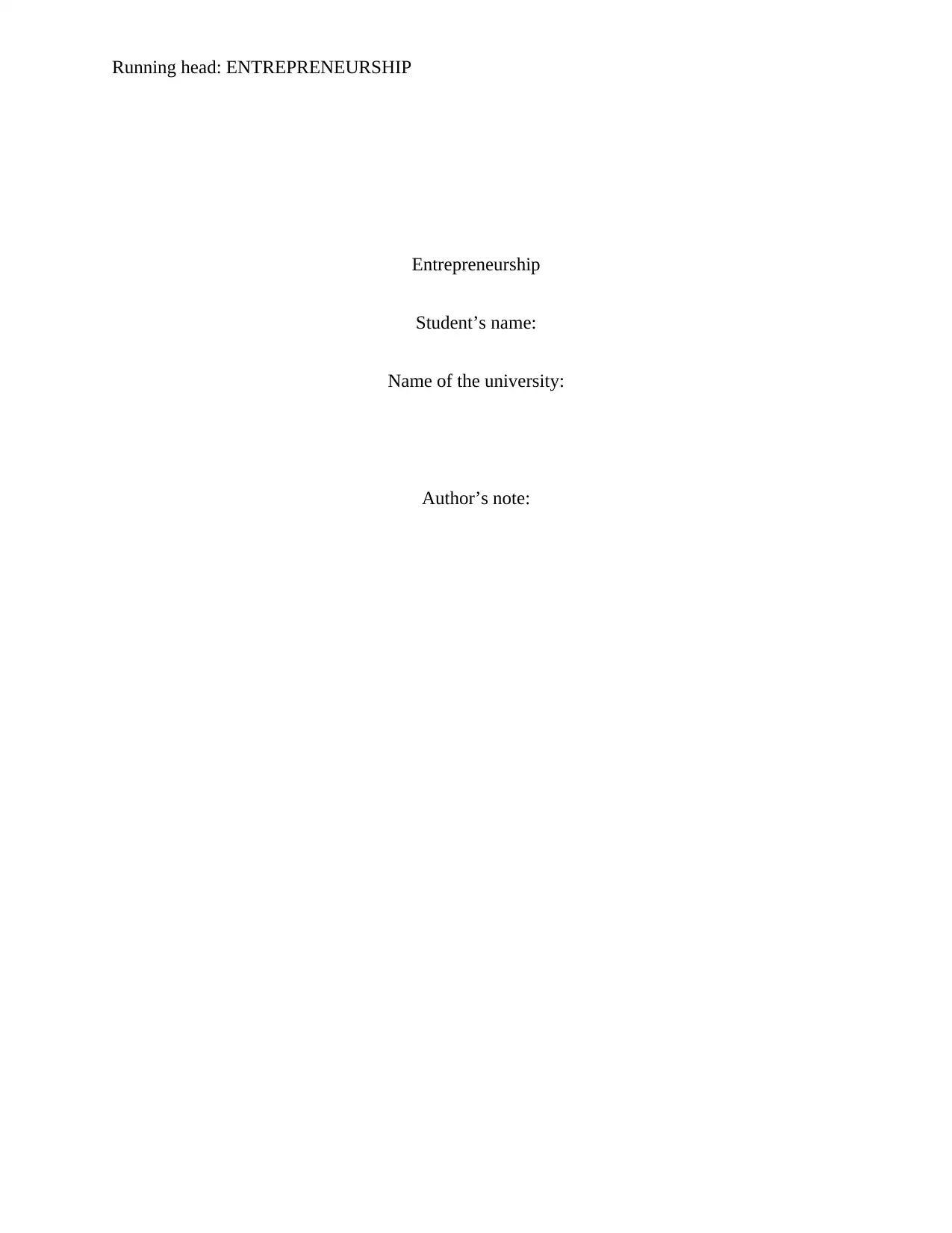
Running head: ENTREPRENEURSHIP
Entrepreneurship
Student’s name:
Name of the university:
Author’s note:
Entrepreneurship
Student’s name:
Name of the university:
Author’s note:
Paraphrase This Document
Need a fresh take? Get an instant paraphrase of this document with our AI Paraphraser
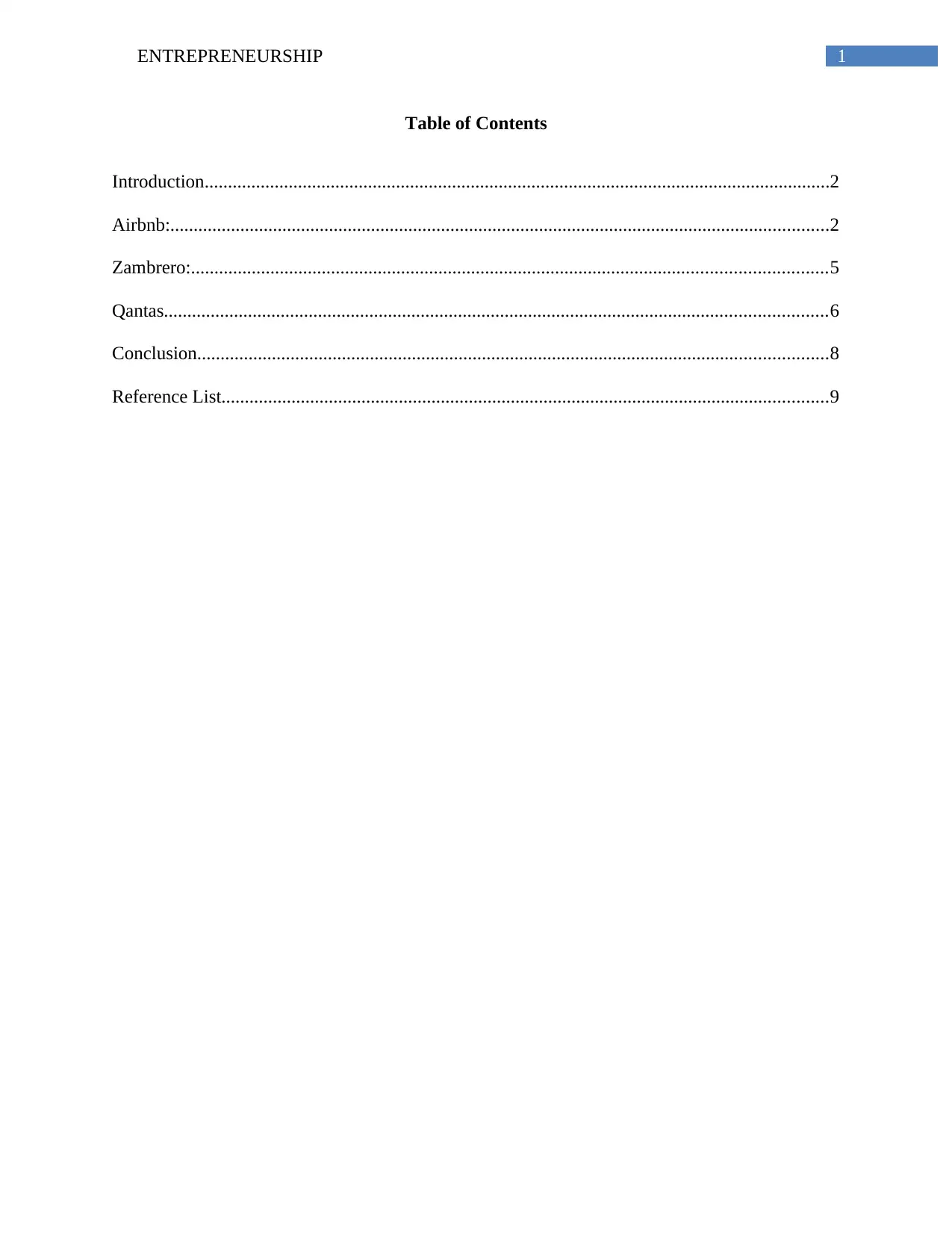
1ENTREPRENEURSHIP
Table of Contents
Introduction......................................................................................................................................2
Airbnb:.............................................................................................................................................2
Zambrero:........................................................................................................................................5
Qantas..............................................................................................................................................6
Conclusion.......................................................................................................................................8
Reference List..................................................................................................................................9
Table of Contents
Introduction......................................................................................................................................2
Airbnb:.............................................................................................................................................2
Zambrero:........................................................................................................................................5
Qantas..............................................................................................................................................6
Conclusion.......................................................................................................................................8
Reference List..................................................................................................................................9
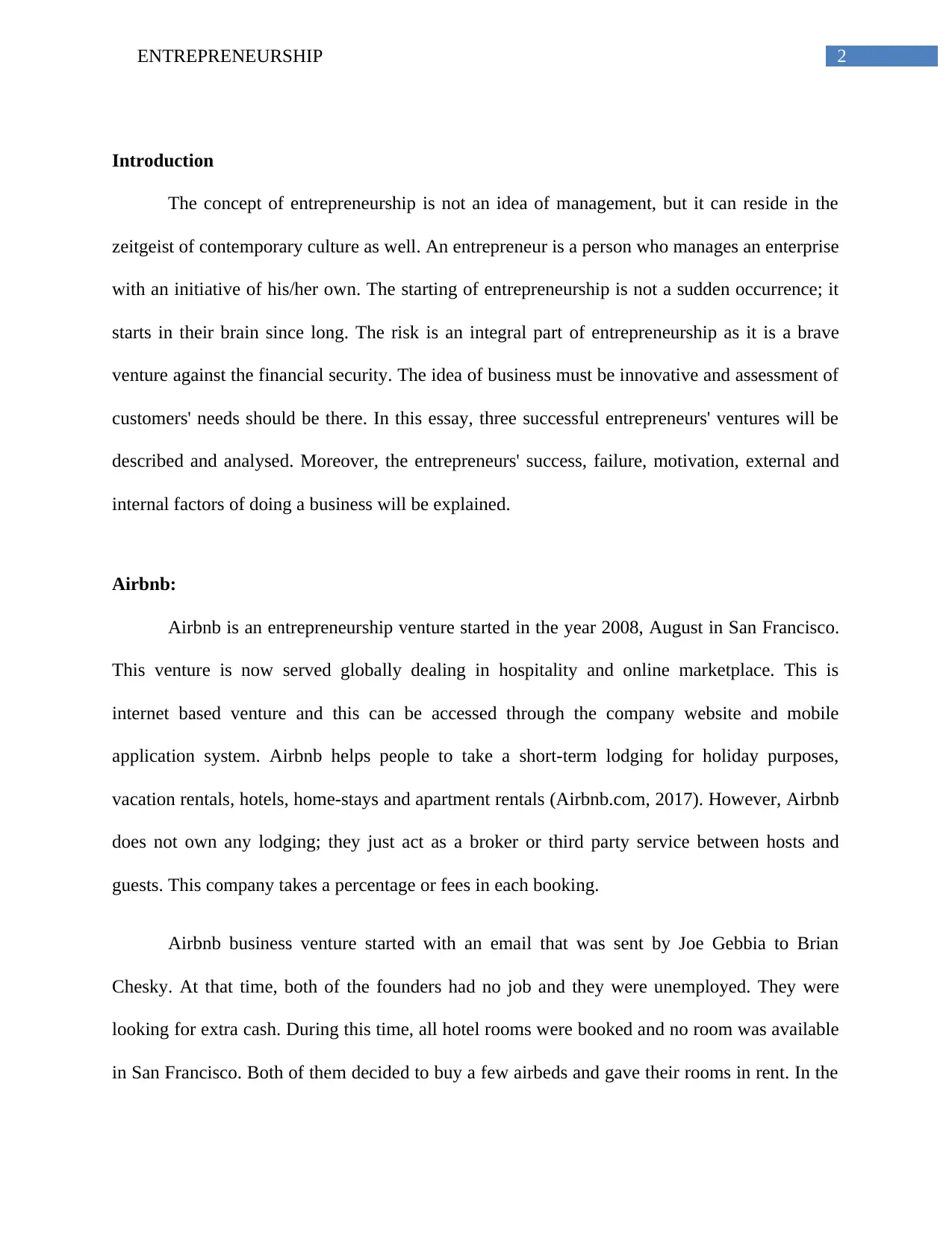
2ENTREPRENEURSHIP
Introduction
The concept of entrepreneurship is not an idea of management, but it can reside in the
zeitgeist of contemporary culture as well. An entrepreneur is a person who manages an enterprise
with an initiative of his/her own. The starting of entrepreneurship is not a sudden occurrence; it
starts in their brain since long. The risk is an integral part of entrepreneurship as it is a brave
venture against the financial security. The idea of business must be innovative and assessment of
customers' needs should be there. In this essay, three successful entrepreneurs' ventures will be
described and analysed. Moreover, the entrepreneurs' success, failure, motivation, external and
internal factors of doing a business will be explained.
Airbnb:
Airbnb is an entrepreneurship venture started in the year 2008, August in San Francisco.
This venture is now served globally dealing in hospitality and online marketplace. This is
internet based venture and this can be accessed through the company website and mobile
application system. Airbnb helps people to take a short-term lodging for holiday purposes,
vacation rentals, hotels, home-stays and apartment rentals (Airbnb.com, 2017). However, Airbnb
does not own any lodging; they just act as a broker or third party service between hosts and
guests. This company takes a percentage or fees in each booking.
Airbnb business venture started with an email that was sent by Joe Gebbia to Brian
Chesky. At that time, both of the founders had no job and they were unemployed. They were
looking for extra cash. During this time, all hotel rooms were booked and no room was available
in San Francisco. Both of them decided to buy a few airbeds and gave their rooms in rent. In the
Introduction
The concept of entrepreneurship is not an idea of management, but it can reside in the
zeitgeist of contemporary culture as well. An entrepreneur is a person who manages an enterprise
with an initiative of his/her own. The starting of entrepreneurship is not a sudden occurrence; it
starts in their brain since long. The risk is an integral part of entrepreneurship as it is a brave
venture against the financial security. The idea of business must be innovative and assessment of
customers' needs should be there. In this essay, three successful entrepreneurs' ventures will be
described and analysed. Moreover, the entrepreneurs' success, failure, motivation, external and
internal factors of doing a business will be explained.
Airbnb:
Airbnb is an entrepreneurship venture started in the year 2008, August in San Francisco.
This venture is now served globally dealing in hospitality and online marketplace. This is
internet based venture and this can be accessed through the company website and mobile
application system. Airbnb helps people to take a short-term lodging for holiday purposes,
vacation rentals, hotels, home-stays and apartment rentals (Airbnb.com, 2017). However, Airbnb
does not own any lodging; they just act as a broker or third party service between hosts and
guests. This company takes a percentage or fees in each booking.
Airbnb business venture started with an email that was sent by Joe Gebbia to Brian
Chesky. At that time, both of the founders had no job and they were unemployed. They were
looking for extra cash. During this time, all hotel rooms were booked and no room was available
in San Francisco. Both of them decided to buy a few airbeds and gave their rooms in rent. In the
⊘ This is a preview!⊘
Do you want full access?
Subscribe today to unlock all pages.

Trusted by 1+ million students worldwide
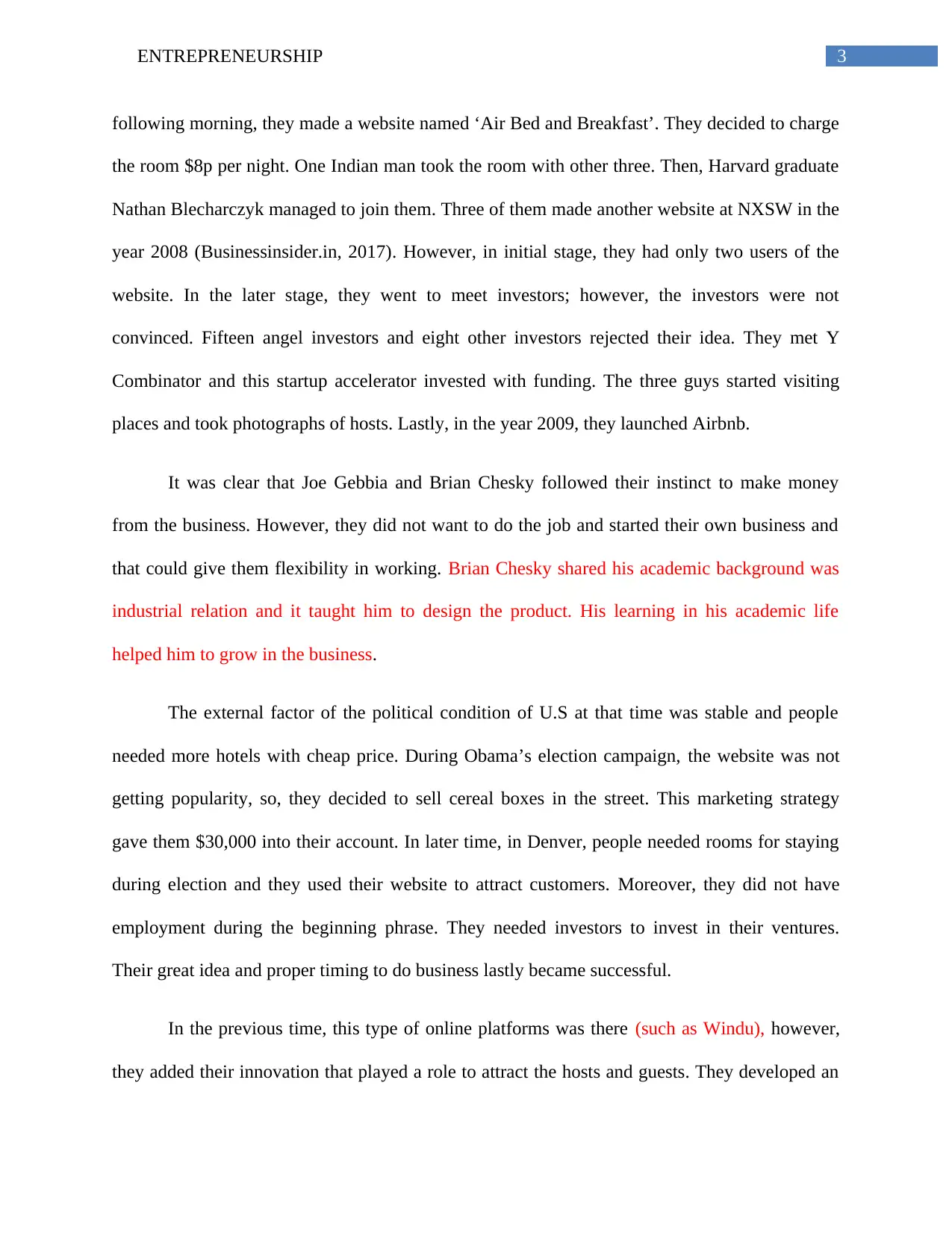
3ENTREPRENEURSHIP
following morning, they made a website named ‘Air Bed and Breakfast’. They decided to charge
the room $8p per night. One Indian man took the room with other three. Then, Harvard graduate
Nathan Blecharczyk managed to join them. Three of them made another website at NXSW in the
year 2008 (Businessinsider.in, 2017). However, in initial stage, they had only two users of the
website. In the later stage, they went to meet investors; however, the investors were not
convinced. Fifteen angel investors and eight other investors rejected their idea. They met Y
Combinator and this startup accelerator invested with funding. The three guys started visiting
places and took photographs of hosts. Lastly, in the year 2009, they launched Airbnb.
It was clear that Joe Gebbia and Brian Chesky followed their instinct to make money
from the business. However, they did not want to do the job and started their own business and
that could give them flexibility in working. Brian Chesky shared his academic background was
industrial relation and it taught him to design the product. His learning in his academic life
helped him to grow in the business.
The external factor of the political condition of U.S at that time was stable and people
needed more hotels with cheap price. During Obama’s election campaign, the website was not
getting popularity, so, they decided to sell cereal boxes in the street. This marketing strategy
gave them $30,000 into their account. In later time, in Denver, people needed rooms for staying
during election and they used their website to attract customers. Moreover, they did not have
employment during the beginning phrase. They needed investors to invest in their ventures.
Their great idea and proper timing to do business lastly became successful.
In the previous time, this type of online platforms was there (such as Windu), however,
they added their innovation that played a role to attract the hosts and guests. They developed an
following morning, they made a website named ‘Air Bed and Breakfast’. They decided to charge
the room $8p per night. One Indian man took the room with other three. Then, Harvard graduate
Nathan Blecharczyk managed to join them. Three of them made another website at NXSW in the
year 2008 (Businessinsider.in, 2017). However, in initial stage, they had only two users of the
website. In the later stage, they went to meet investors; however, the investors were not
convinced. Fifteen angel investors and eight other investors rejected their idea. They met Y
Combinator and this startup accelerator invested with funding. The three guys started visiting
places and took photographs of hosts. Lastly, in the year 2009, they launched Airbnb.
It was clear that Joe Gebbia and Brian Chesky followed their instinct to make money
from the business. However, they did not want to do the job and started their own business and
that could give them flexibility in working. Brian Chesky shared his academic background was
industrial relation and it taught him to design the product. His learning in his academic life
helped him to grow in the business.
The external factor of the political condition of U.S at that time was stable and people
needed more hotels with cheap price. During Obama’s election campaign, the website was not
getting popularity, so, they decided to sell cereal boxes in the street. This marketing strategy
gave them $30,000 into their account. In later time, in Denver, people needed rooms for staying
during election and they used their website to attract customers. Moreover, they did not have
employment during the beginning phrase. They needed investors to invest in their ventures.
Their great idea and proper timing to do business lastly became successful.
In the previous time, this type of online platforms was there (such as Windu), however,
they added their innovation that played a role to attract the hosts and guests. They developed an
Paraphrase This Document
Need a fresh take? Get an instant paraphrase of this document with our AI Paraphraser
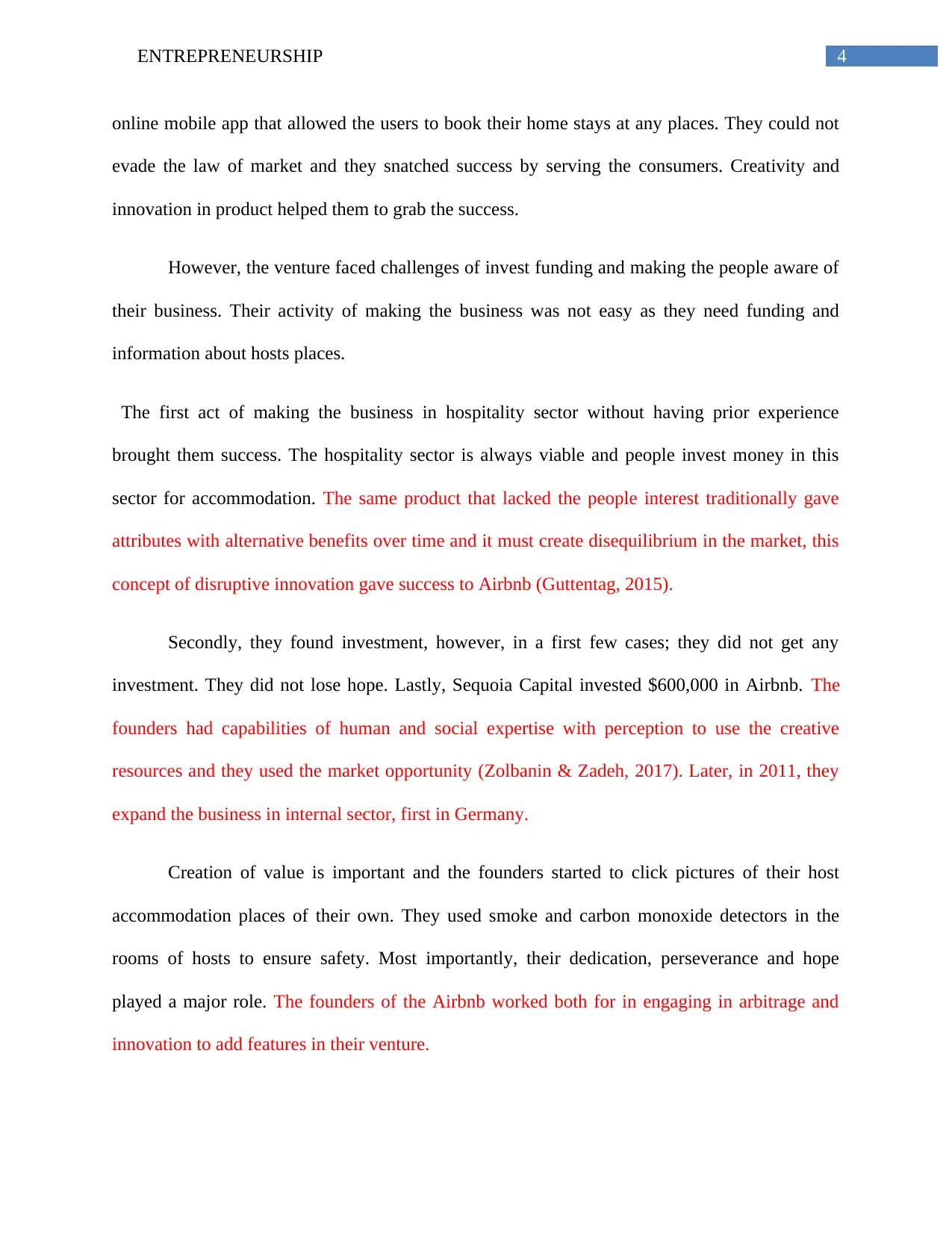
4ENTREPRENEURSHIP
online mobile app that allowed the users to book their home stays at any places. They could not
evade the law of market and they snatched success by serving the consumers. Creativity and
innovation in product helped them to grab the success.
However, the venture faced challenges of invest funding and making the people aware of
their business. Their activity of making the business was not easy as they need funding and
information about hosts places.
The first act of making the business in hospitality sector without having prior experience
brought them success. The hospitality sector is always viable and people invest money in this
sector for accommodation. The same product that lacked the people interest traditionally gave
attributes with alternative benefits over time and it must create disequilibrium in the market, this
concept of disruptive innovation gave success to Airbnb (Guttentag, 2015).
Secondly, they found investment, however, in a first few cases; they did not get any
investment. They did not lose hope. Lastly, Sequoia Capital invested $600,000 in Airbnb. The
founders had capabilities of human and social expertise with perception to use the creative
resources and they used the market opportunity (Zolbanin & Zadeh, 2017). Later, in 2011, they
expand the business in internal sector, first in Germany.
Creation of value is important and the founders started to click pictures of their host
accommodation places of their own. They used smoke and carbon monoxide detectors in the
rooms of hosts to ensure safety. Most importantly, their dedication, perseverance and hope
played a major role. The founders of the Airbnb worked both for in engaging in arbitrage and
innovation to add features in their venture.
online mobile app that allowed the users to book their home stays at any places. They could not
evade the law of market and they snatched success by serving the consumers. Creativity and
innovation in product helped them to grab the success.
However, the venture faced challenges of invest funding and making the people aware of
their business. Their activity of making the business was not easy as they need funding and
information about hosts places.
The first act of making the business in hospitality sector without having prior experience
brought them success. The hospitality sector is always viable and people invest money in this
sector for accommodation. The same product that lacked the people interest traditionally gave
attributes with alternative benefits over time and it must create disequilibrium in the market, this
concept of disruptive innovation gave success to Airbnb (Guttentag, 2015).
Secondly, they found investment, however, in a first few cases; they did not get any
investment. They did not lose hope. Lastly, Sequoia Capital invested $600,000 in Airbnb. The
founders had capabilities of human and social expertise with perception to use the creative
resources and they used the market opportunity (Zolbanin & Zadeh, 2017). Later, in 2011, they
expand the business in internal sector, first in Germany.
Creation of value is important and the founders started to click pictures of their host
accommodation places of their own. They used smoke and carbon monoxide detectors in the
rooms of hosts to ensure safety. Most importantly, their dedication, perseverance and hope
played a major role. The founders of the Airbnb worked both for in engaging in arbitrage and
innovation to add features in their venture.
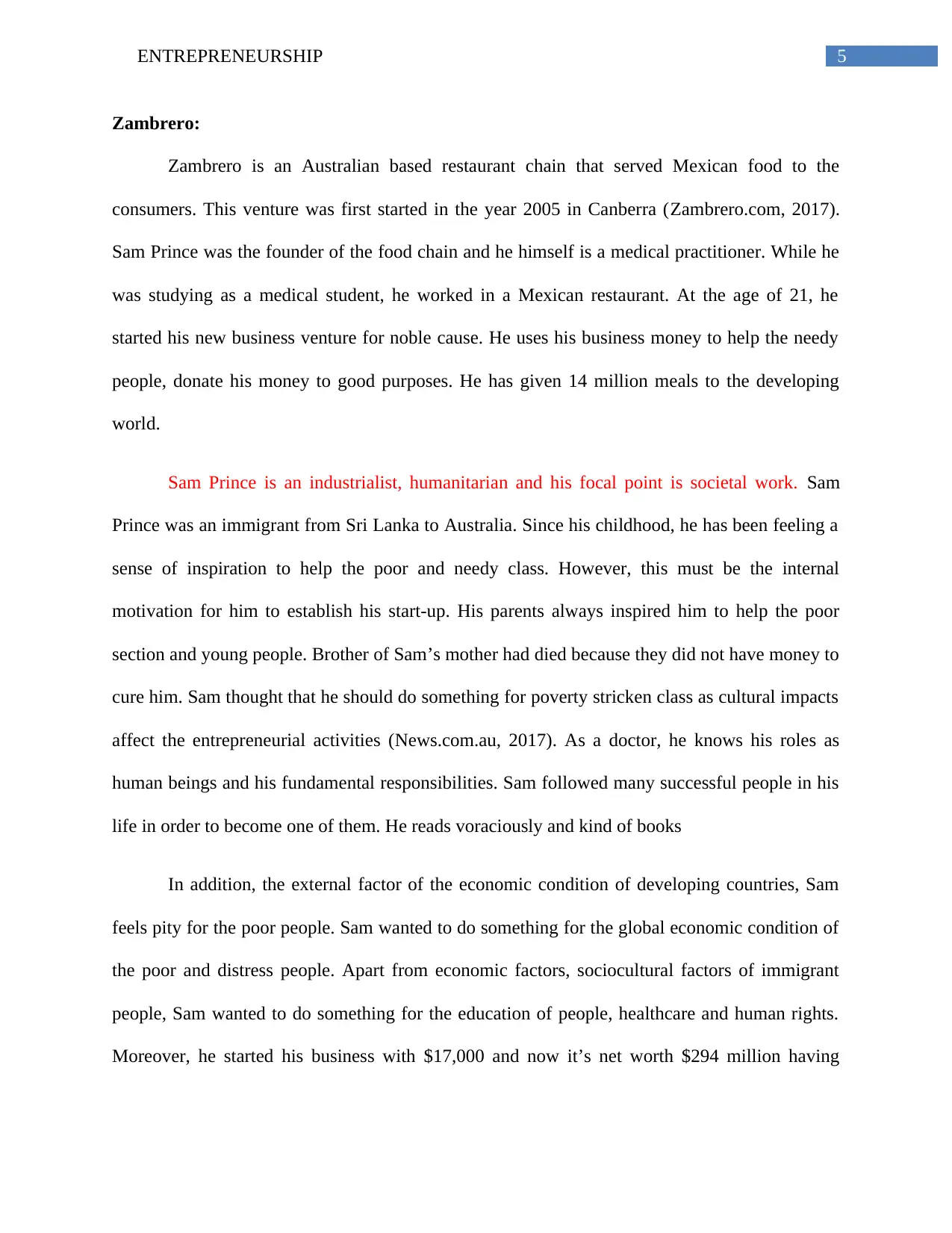
5ENTREPRENEURSHIP
Zambrero:
Zambrero is an Australian based restaurant chain that served Mexican food to the
consumers. This venture was first started in the year 2005 in Canberra (Zambrero.com, 2017).
Sam Prince was the founder of the food chain and he himself is a medical practitioner. While he
was studying as a medical student, he worked in a Mexican restaurant. At the age of 21, he
started his new business venture for noble cause. He uses his business money to help the needy
people, donate his money to good purposes. He has given 14 million meals to the developing
world.
Sam Prince is an industrialist, humanitarian and his focal point is societal work. Sam
Prince was an immigrant from Sri Lanka to Australia. Since his childhood, he has been feeling a
sense of inspiration to help the poor and needy class. However, this must be the internal
motivation for him to establish his start-up. His parents always inspired him to help the poor
section and young people. Brother of Sam’s mother had died because they did not have money to
cure him. Sam thought that he should do something for poverty stricken class as cultural impacts
affect the entrepreneurial activities (News.com.au, 2017). As a doctor, he knows his roles as
human beings and his fundamental responsibilities. Sam followed many successful people in his
life in order to become one of them. He reads voraciously and kind of books
In addition, the external factor of the economic condition of developing countries, Sam
feels pity for the poor people. Sam wanted to do something for the global economic condition of
the poor and distress people. Apart from economic factors, sociocultural factors of immigrant
people, Sam wanted to do something for the education of people, healthcare and human rights.
Moreover, he started his business with $17,000 and now it’s net worth $294 million having
Zambrero:
Zambrero is an Australian based restaurant chain that served Mexican food to the
consumers. This venture was first started in the year 2005 in Canberra (Zambrero.com, 2017).
Sam Prince was the founder of the food chain and he himself is a medical practitioner. While he
was studying as a medical student, he worked in a Mexican restaurant. At the age of 21, he
started his new business venture for noble cause. He uses his business money to help the needy
people, donate his money to good purposes. He has given 14 million meals to the developing
world.
Sam Prince is an industrialist, humanitarian and his focal point is societal work. Sam
Prince was an immigrant from Sri Lanka to Australia. Since his childhood, he has been feeling a
sense of inspiration to help the poor and needy class. However, this must be the internal
motivation for him to establish his start-up. His parents always inspired him to help the poor
section and young people. Brother of Sam’s mother had died because they did not have money to
cure him. Sam thought that he should do something for poverty stricken class as cultural impacts
affect the entrepreneurial activities (News.com.au, 2017). As a doctor, he knows his roles as
human beings and his fundamental responsibilities. Sam followed many successful people in his
life in order to become one of them. He reads voraciously and kind of books
In addition, the external factor of the economic condition of developing countries, Sam
feels pity for the poor people. Sam wanted to do something for the global economic condition of
the poor and distress people. Apart from economic factors, sociocultural factors of immigrant
people, Sam wanted to do something for the education of people, healthcare and human rights.
Moreover, he started his business with $17,000 and now it’s net worth $294 million having
⊘ This is a preview!⊘
Do you want full access?
Subscribe today to unlock all pages.

Trusted by 1+ million students worldwide
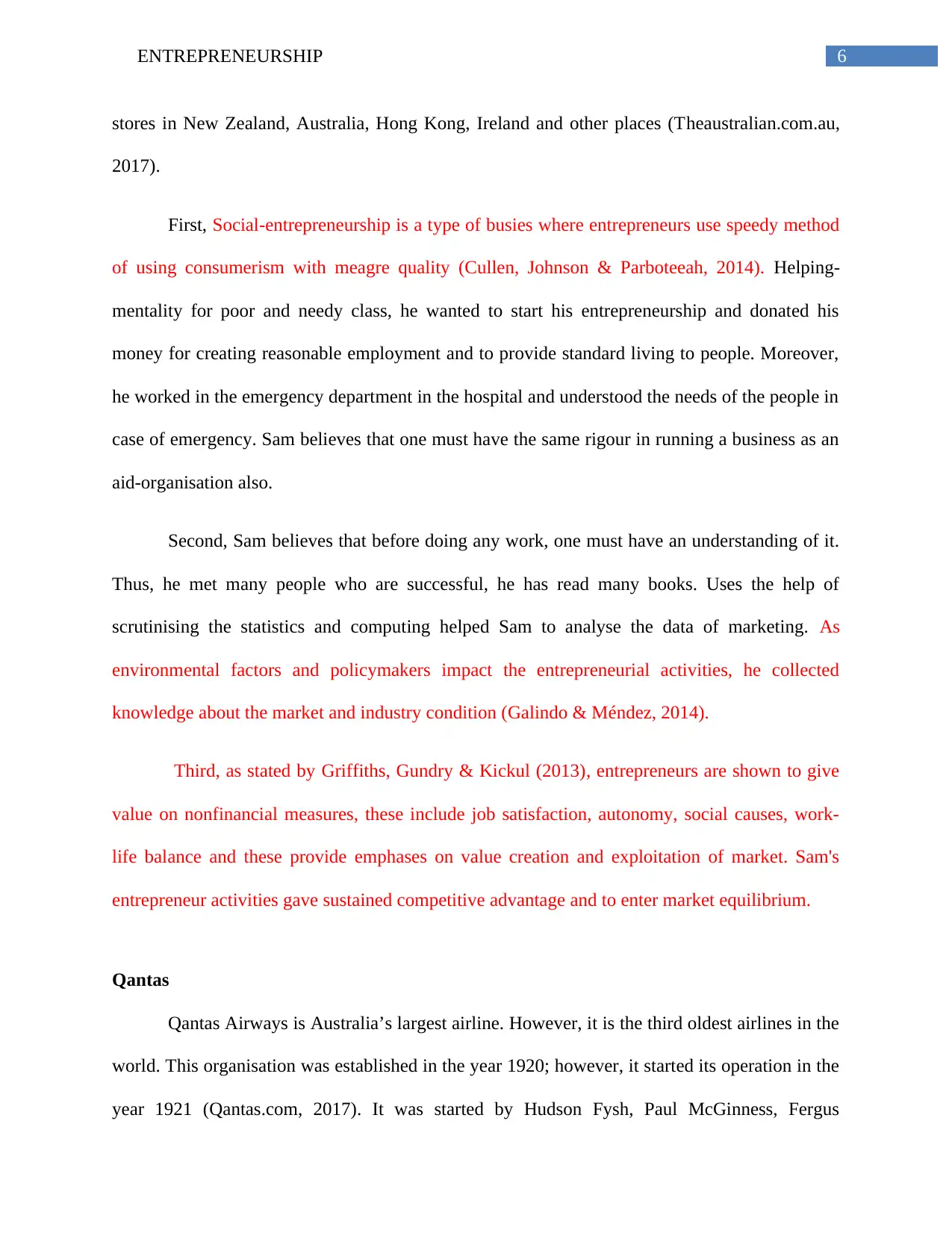
6ENTREPRENEURSHIP
stores in New Zealand, Australia, Hong Kong, Ireland and other places (Theaustralian.com.au,
2017).
First, Social-entrepreneurship is a type of busies where entrepreneurs use speedy method
of using consumerism with meagre quality (Cullen, Johnson & Parboteeah, 2014). Helping-
mentality for poor and needy class, he wanted to start his entrepreneurship and donated his
money for creating reasonable employment and to provide standard living to people. Moreover,
he worked in the emergency department in the hospital and understood the needs of the people in
case of emergency. Sam believes that one must have the same rigour in running a business as an
aid-organisation also.
Second, Sam believes that before doing any work, one must have an understanding of it.
Thus, he met many people who are successful, he has read many books. Uses the help of
scrutinising the statistics and computing helped Sam to analyse the data of marketing. As
environmental factors and policymakers impact the entrepreneurial activities, he collected
knowledge about the market and industry condition (Galindo & Méndez, 2014).
Third, as stated by Griffiths, Gundry & Kickul (2013), entrepreneurs are shown to give
value on nonfinancial measures, these include job satisfaction, autonomy, social causes, work-
life balance and these provide emphases on value creation and exploitation of market. Sam's
entrepreneur activities gave sustained competitive advantage and to enter market equilibrium.
Qantas
Qantas Airways is Australia’s largest airline. However, it is the third oldest airlines in the
world. This organisation was established in the year 1920; however, it started its operation in the
year 1921 (Qantas.com, 2017). It was started by Hudson Fysh, Paul McGinness, Fergus
stores in New Zealand, Australia, Hong Kong, Ireland and other places (Theaustralian.com.au,
2017).
First, Social-entrepreneurship is a type of busies where entrepreneurs use speedy method
of using consumerism with meagre quality (Cullen, Johnson & Parboteeah, 2014). Helping-
mentality for poor and needy class, he wanted to start his entrepreneurship and donated his
money for creating reasonable employment and to provide standard living to people. Moreover,
he worked in the emergency department in the hospital and understood the needs of the people in
case of emergency. Sam believes that one must have the same rigour in running a business as an
aid-organisation also.
Second, Sam believes that before doing any work, one must have an understanding of it.
Thus, he met many people who are successful, he has read many books. Uses the help of
scrutinising the statistics and computing helped Sam to analyse the data of marketing. As
environmental factors and policymakers impact the entrepreneurial activities, he collected
knowledge about the market and industry condition (Galindo & Méndez, 2014).
Third, as stated by Griffiths, Gundry & Kickul (2013), entrepreneurs are shown to give
value on nonfinancial measures, these include job satisfaction, autonomy, social causes, work-
life balance and these provide emphases on value creation and exploitation of market. Sam's
entrepreneur activities gave sustained competitive advantage and to enter market equilibrium.
Qantas
Qantas Airways is Australia’s largest airline. However, it is the third oldest airlines in the
world. This organisation was established in the year 1920; however, it started its operation in the
year 1921 (Qantas.com, 2017). It was started by Hudson Fysh, Paul McGinness, Fergus
Paraphrase This Document
Need a fresh take? Get an instant paraphrase of this document with our AI Paraphraser
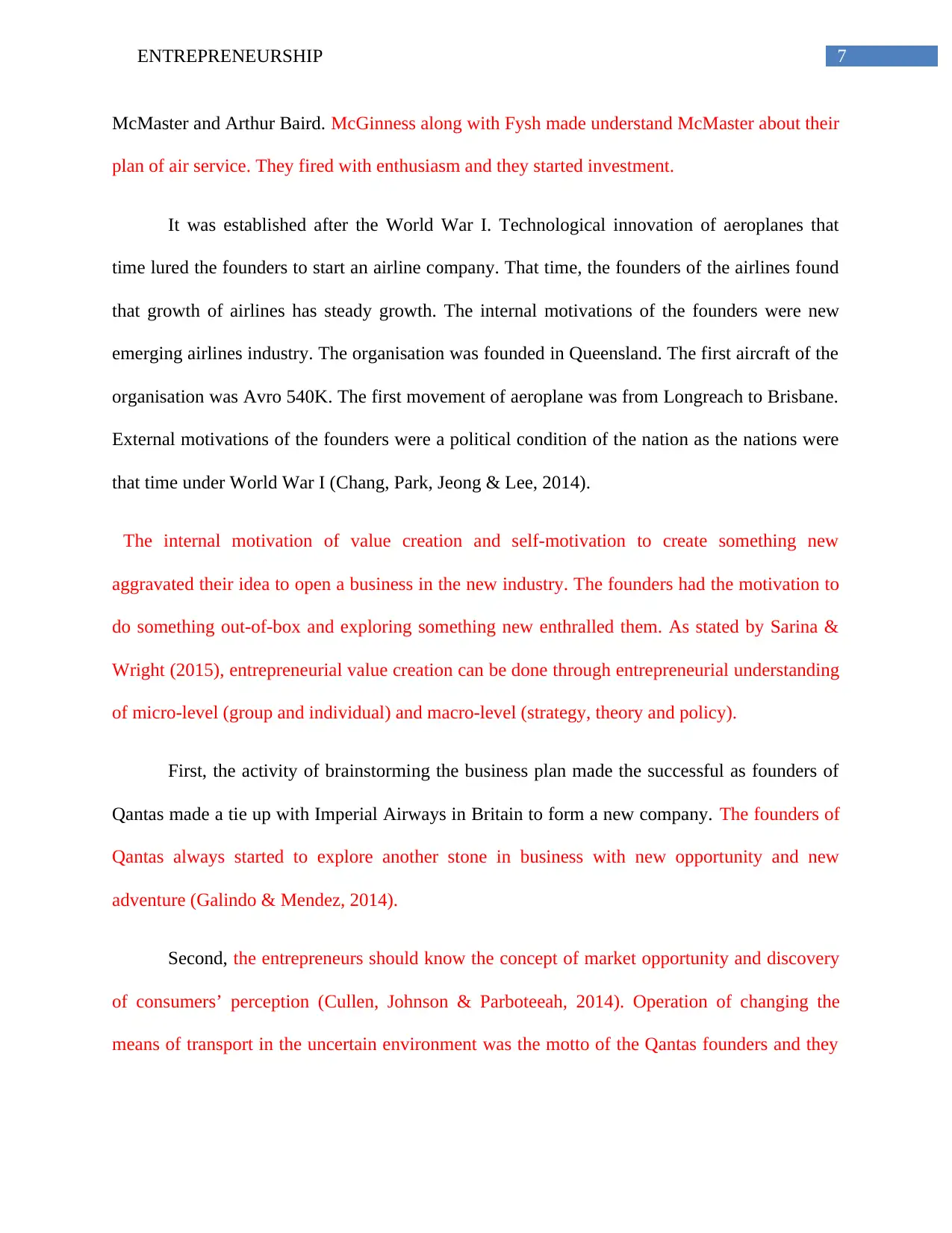
7ENTREPRENEURSHIP
McMaster and Arthur Baird. McGinness along with Fysh made understand McMaster about their
plan of air service. They fired with enthusiasm and they started investment.
It was established after the World War I. Technological innovation of aeroplanes that
time lured the founders to start an airline company. That time, the founders of the airlines found
that growth of airlines has steady growth. The internal motivations of the founders were new
emerging airlines industry. The organisation was founded in Queensland. The first aircraft of the
organisation was Avro 540K. The first movement of aeroplane was from Longreach to Brisbane.
External motivations of the founders were a political condition of the nation as the nations were
that time under World War I (Chang, Park, Jeong & Lee, 2014).
The internal motivation of value creation and self-motivation to create something new
aggravated their idea to open a business in the new industry. The founders had the motivation to
do something out-of-box and exploring something new enthralled them. As stated by Sarina &
Wright (2015), entrepreneurial value creation can be done through entrepreneurial understanding
of micro-level (group and individual) and macro-level (strategy, theory and policy).
First, the activity of brainstorming the business plan made the successful as founders of
Qantas made a tie up with Imperial Airways in Britain to form a new company. The founders of
Qantas always started to explore another stone in business with new opportunity and new
adventure (Galindo & Mendez, 2014).
Second, the entrepreneurs should know the concept of market opportunity and discovery
of consumers’ perception (Cullen, Johnson & Parboteeah, 2014). Operation of changing the
means of transport in the uncertain environment was the motto of the Qantas founders and they
McMaster and Arthur Baird. McGinness along with Fysh made understand McMaster about their
plan of air service. They fired with enthusiasm and they started investment.
It was established after the World War I. Technological innovation of aeroplanes that
time lured the founders to start an airline company. That time, the founders of the airlines found
that growth of airlines has steady growth. The internal motivations of the founders were new
emerging airlines industry. The organisation was founded in Queensland. The first aircraft of the
organisation was Avro 540K. The first movement of aeroplane was from Longreach to Brisbane.
External motivations of the founders were a political condition of the nation as the nations were
that time under World War I (Chang, Park, Jeong & Lee, 2014).
The internal motivation of value creation and self-motivation to create something new
aggravated their idea to open a business in the new industry. The founders had the motivation to
do something out-of-box and exploring something new enthralled them. As stated by Sarina &
Wright (2015), entrepreneurial value creation can be done through entrepreneurial understanding
of micro-level (group and individual) and macro-level (strategy, theory and policy).
First, the activity of brainstorming the business plan made the successful as founders of
Qantas made a tie up with Imperial Airways in Britain to form a new company. The founders of
Qantas always started to explore another stone in business with new opportunity and new
adventure (Galindo & Mendez, 2014).
Second, the entrepreneurs should know the concept of market opportunity and discovery
of consumers’ perception (Cullen, Johnson & Parboteeah, 2014). Operation of changing the
means of transport in the uncertain environment was the motto of the Qantas founders and they
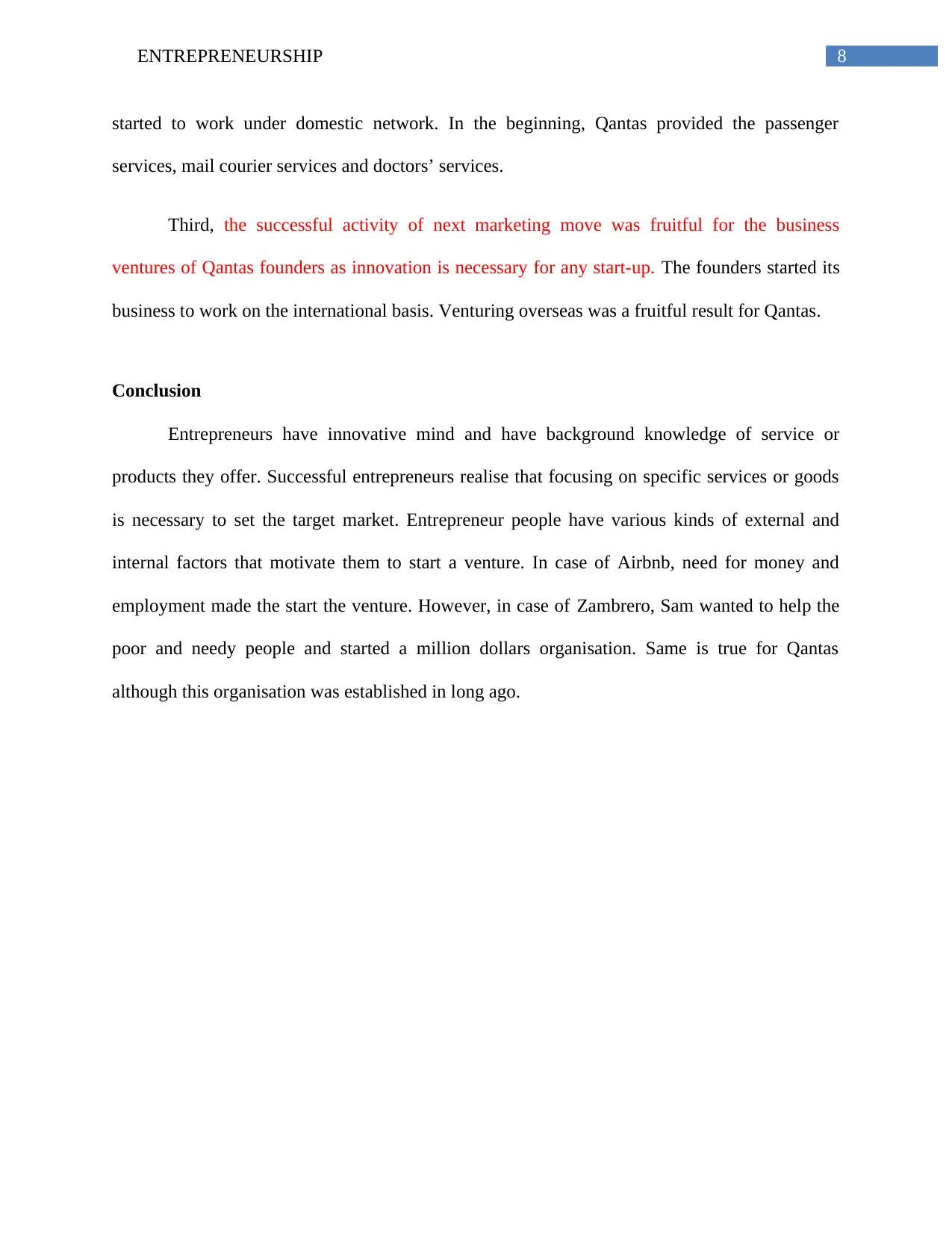
8ENTREPRENEURSHIP
started to work under domestic network. In the beginning, Qantas provided the passenger
services, mail courier services and doctors’ services.
Third, the successful activity of next marketing move was fruitful for the business
ventures of Qantas founders as innovation is necessary for any start-up. The founders started its
business to work on the international basis. Venturing overseas was a fruitful result for Qantas.
Conclusion
Entrepreneurs have innovative mind and have background knowledge of service or
products they offer. Successful entrepreneurs realise that focusing on specific services or goods
is necessary to set the target market. Entrepreneur people have various kinds of external and
internal factors that motivate them to start a venture. In case of Airbnb, need for money and
employment made the start the venture. However, in case of Zambrero, Sam wanted to help the
poor and needy people and started a million dollars organisation. Same is true for Qantas
although this organisation was established in long ago.
started to work under domestic network. In the beginning, Qantas provided the passenger
services, mail courier services and doctors’ services.
Third, the successful activity of next marketing move was fruitful for the business
ventures of Qantas founders as innovation is necessary for any start-up. The founders started its
business to work on the international basis. Venturing overseas was a fruitful result for Qantas.
Conclusion
Entrepreneurs have innovative mind and have background knowledge of service or
products they offer. Successful entrepreneurs realise that focusing on specific services or goods
is necessary to set the target market. Entrepreneur people have various kinds of external and
internal factors that motivate them to start a venture. In case of Airbnb, need for money and
employment made the start the venture. However, in case of Zambrero, Sam wanted to help the
poor and needy people and started a million dollars organisation. Same is true for Qantas
although this organisation was established in long ago.
⊘ This is a preview!⊘
Do you want full access?
Subscribe today to unlock all pages.

Trusted by 1+ million students worldwide
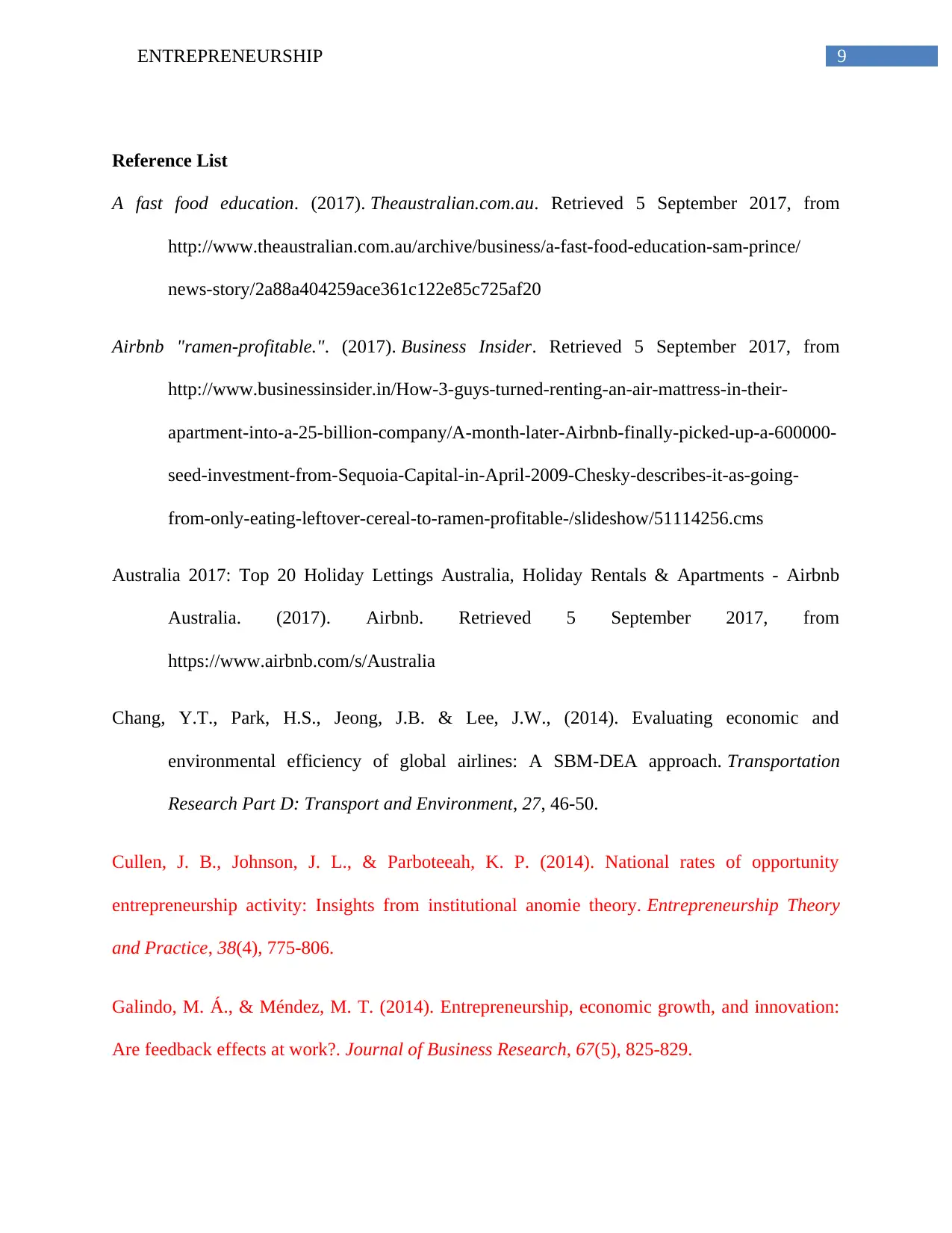
9ENTREPRENEURSHIP
Reference List
A fast food education. (2017). Theaustralian.com.au. Retrieved 5 September 2017, from
http://www.theaustralian.com.au/archive/business/a-fast-food-education-sam-prince/
news-story/2a88a404259ace361c122e85c725af20
Airbnb "ramen-profitable.". (2017). Business Insider. Retrieved 5 September 2017, from
http://www.businessinsider.in/How-3-guys-turned-renting-an-air-mattress-in-their-
apartment-into-a-25-billion-company/A-month-later-Airbnb-finally-picked-up-a-600000-
seed-investment-from-Sequoia-Capital-in-April-2009-Chesky-describes-it-as-going-
from-only-eating-leftover-cereal-to-ramen-profitable-/slideshow/51114256.cms
Australia 2017: Top 20 Holiday Lettings Australia, Holiday Rentals & Apartments - Airbnb
Australia. (2017). Airbnb. Retrieved 5 September 2017, from
https://www.airbnb.com/s/Australia
Chang, Y.T., Park, H.S., Jeong, J.B. & Lee, J.W., (2014). Evaluating economic and
environmental efficiency of global airlines: A SBM-DEA approach. Transportation
Research Part D: Transport and Environment, 27, 46-50.
Cullen, J. B., Johnson, J. L., & Parboteeah, K. P. (2014). National rates of opportunity
entrepreneurship activity: Insights from institutional anomie theory. Entrepreneurship Theory
and Practice, 38(4), 775-806.
Galindo, M. Á., & Méndez, M. T. (2014). Entrepreneurship, economic growth, and innovation:
Are feedback effects at work?. Journal of Business Research, 67(5), 825-829.
Reference List
A fast food education. (2017). Theaustralian.com.au. Retrieved 5 September 2017, from
http://www.theaustralian.com.au/archive/business/a-fast-food-education-sam-prince/
news-story/2a88a404259ace361c122e85c725af20
Airbnb "ramen-profitable.". (2017). Business Insider. Retrieved 5 September 2017, from
http://www.businessinsider.in/How-3-guys-turned-renting-an-air-mattress-in-their-
apartment-into-a-25-billion-company/A-month-later-Airbnb-finally-picked-up-a-600000-
seed-investment-from-Sequoia-Capital-in-April-2009-Chesky-describes-it-as-going-
from-only-eating-leftover-cereal-to-ramen-profitable-/slideshow/51114256.cms
Australia 2017: Top 20 Holiday Lettings Australia, Holiday Rentals & Apartments - Airbnb
Australia. (2017). Airbnb. Retrieved 5 September 2017, from
https://www.airbnb.com/s/Australia
Chang, Y.T., Park, H.S., Jeong, J.B. & Lee, J.W., (2014). Evaluating economic and
environmental efficiency of global airlines: A SBM-DEA approach. Transportation
Research Part D: Transport and Environment, 27, 46-50.
Cullen, J. B., Johnson, J. L., & Parboteeah, K. P. (2014). National rates of opportunity
entrepreneurship activity: Insights from institutional anomie theory. Entrepreneurship Theory
and Practice, 38(4), 775-806.
Galindo, M. Á., & Méndez, M. T. (2014). Entrepreneurship, economic growth, and innovation:
Are feedback effects at work?. Journal of Business Research, 67(5), 825-829.
Paraphrase This Document
Need a fresh take? Get an instant paraphrase of this document with our AI Paraphraser
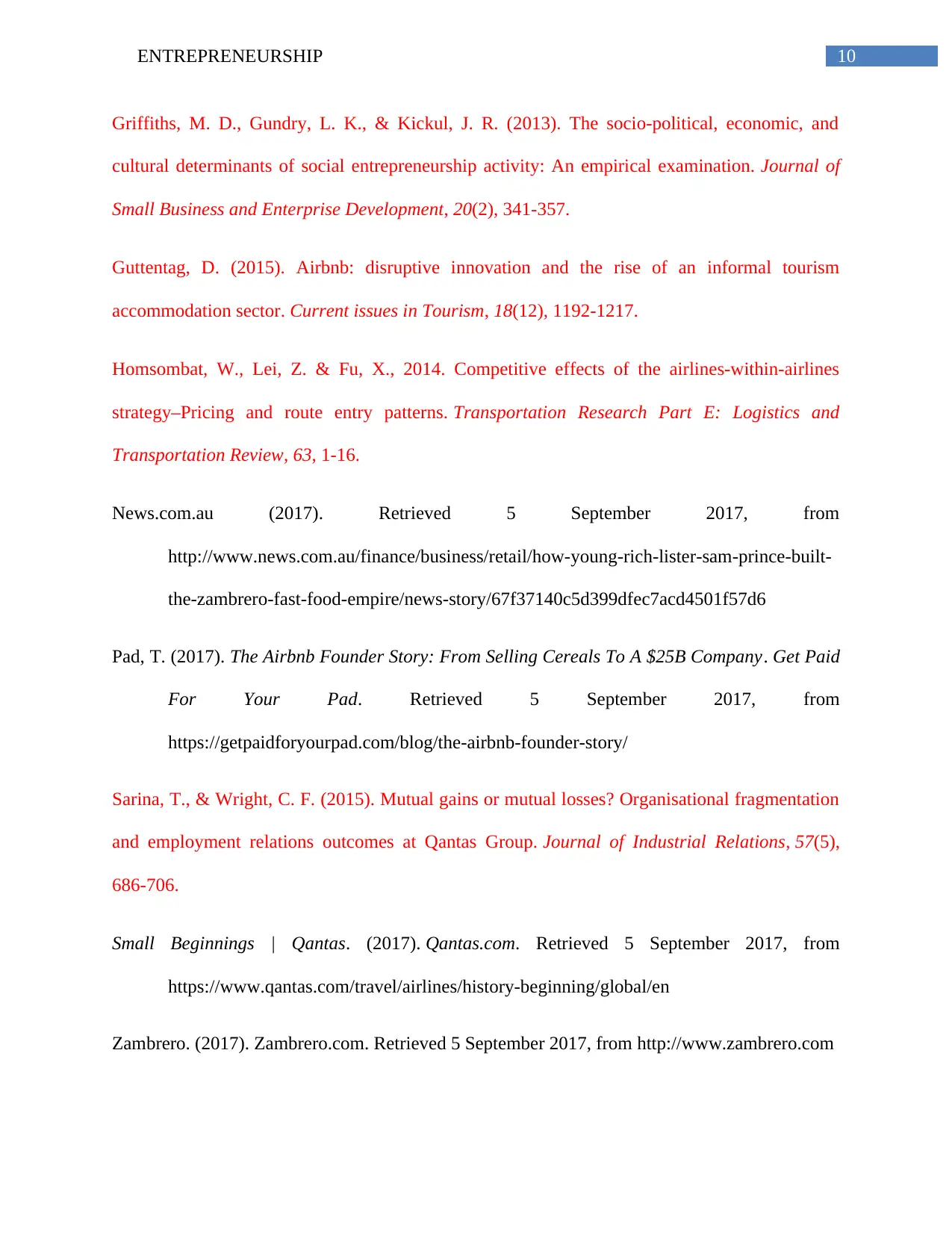
10ENTREPRENEURSHIP
Griffiths, M. D., Gundry, L. K., & Kickul, J. R. (2013). The socio-political, economic, and
cultural determinants of social entrepreneurship activity: An empirical examination. Journal of
Small Business and Enterprise Development, 20(2), 341-357.
Guttentag, D. (2015). Airbnb: disruptive innovation and the rise of an informal tourism
accommodation sector. Current issues in Tourism, 18(12), 1192-1217.
Homsombat, W., Lei, Z. & Fu, X., 2014. Competitive effects of the airlines-within-airlines
strategy–Pricing and route entry patterns. Transportation Research Part E: Logistics and
Transportation Review, 63, 1-16.
News.com.au (2017). Retrieved 5 September 2017, from
http://www.news.com.au/finance/business/retail/how-young-rich-lister-sam-prince-built-
the-zambrero-fast-food-empire/news-story/67f37140c5d399dfec7acd4501f57d6
Pad, T. (2017). The Airbnb Founder Story: From Selling Cereals To A $25B Company. Get Paid
For Your Pad. Retrieved 5 September 2017, from
https://getpaidforyourpad.com/blog/the-airbnb-founder-story/
Sarina, T., & Wright, C. F. (2015). Mutual gains or mutual losses? Organisational fragmentation
and employment relations outcomes at Qantas Group. Journal of Industrial Relations, 57(5),
686-706.
Small Beginnings | Qantas. (2017). Qantas.com. Retrieved 5 September 2017, from
https://www.qantas.com/travel/airlines/history-beginning/global/en
Zambrero. (2017). Zambrero.com. Retrieved 5 September 2017, from http://www.zambrero.com
Griffiths, M. D., Gundry, L. K., & Kickul, J. R. (2013). The socio-political, economic, and
cultural determinants of social entrepreneurship activity: An empirical examination. Journal of
Small Business and Enterprise Development, 20(2), 341-357.
Guttentag, D. (2015). Airbnb: disruptive innovation and the rise of an informal tourism
accommodation sector. Current issues in Tourism, 18(12), 1192-1217.
Homsombat, W., Lei, Z. & Fu, X., 2014. Competitive effects of the airlines-within-airlines
strategy–Pricing and route entry patterns. Transportation Research Part E: Logistics and
Transportation Review, 63, 1-16.
News.com.au (2017). Retrieved 5 September 2017, from
http://www.news.com.au/finance/business/retail/how-young-rich-lister-sam-prince-built-
the-zambrero-fast-food-empire/news-story/67f37140c5d399dfec7acd4501f57d6
Pad, T. (2017). The Airbnb Founder Story: From Selling Cereals To A $25B Company. Get Paid
For Your Pad. Retrieved 5 September 2017, from
https://getpaidforyourpad.com/blog/the-airbnb-founder-story/
Sarina, T., & Wright, C. F. (2015). Mutual gains or mutual losses? Organisational fragmentation
and employment relations outcomes at Qantas Group. Journal of Industrial Relations, 57(5),
686-706.
Small Beginnings | Qantas. (2017). Qantas.com. Retrieved 5 September 2017, from
https://www.qantas.com/travel/airlines/history-beginning/global/en
Zambrero. (2017). Zambrero.com. Retrieved 5 September 2017, from http://www.zambrero.com
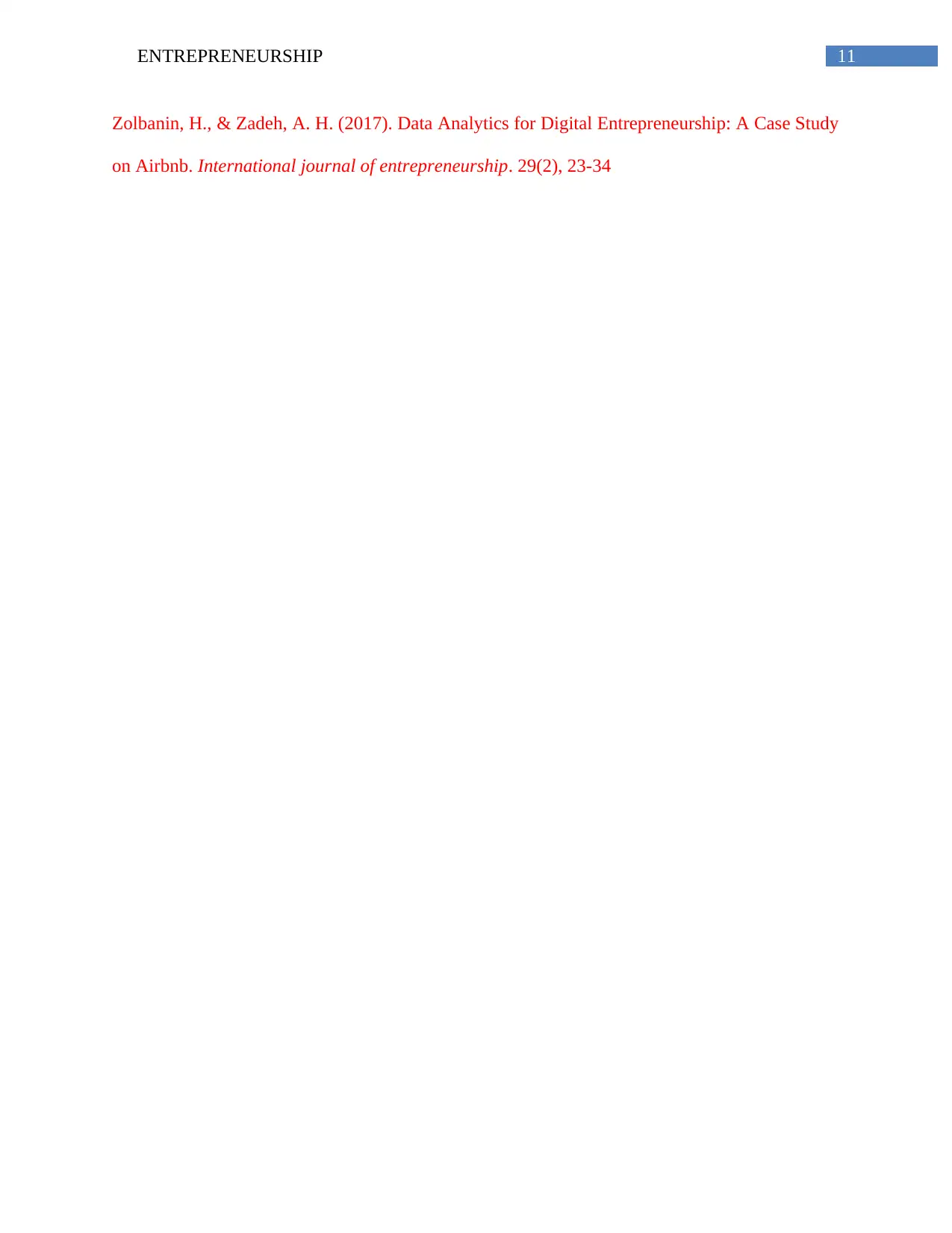
11ENTREPRENEURSHIP
Zolbanin, H., & Zadeh, A. H. (2017). Data Analytics for Digital Entrepreneurship: A Case Study
on Airbnb. International journal of entrepreneurship. 29(2), 23-34
Zolbanin, H., & Zadeh, A. H. (2017). Data Analytics for Digital Entrepreneurship: A Case Study
on Airbnb. International journal of entrepreneurship. 29(2), 23-34
⊘ This is a preview!⊘
Do you want full access?
Subscribe today to unlock all pages.

Trusted by 1+ million students worldwide
1 out of 12
Related Documents
Your All-in-One AI-Powered Toolkit for Academic Success.
+13062052269
info@desklib.com
Available 24*7 on WhatsApp / Email
![[object Object]](/_next/static/media/star-bottom.7253800d.svg)
Unlock your academic potential
Copyright © 2020–2026 A2Z Services. All Rights Reserved. Developed and managed by ZUCOL.





